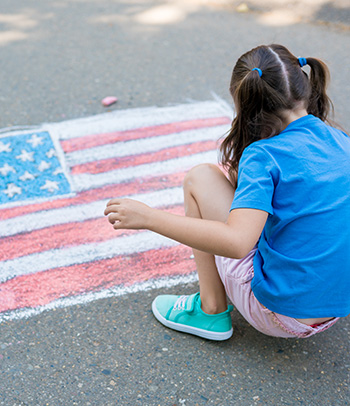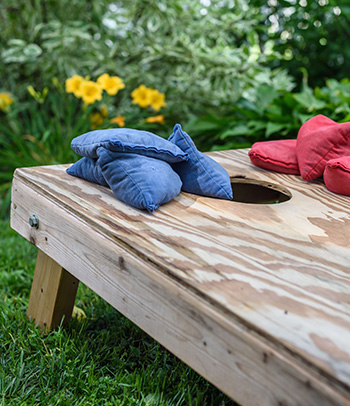This holiday, we can all make a pledge to be mindful of those suffering from PTSD and find ways to make sure this holiday is safe and enjoyable for everyone.
For many Americans, the Fourth of July is a time filled with celebration. It’s a time to celebrate our nation’s independence and the freedoms we enjoy; a time to honor those who serve in the military to protect those freedoms; a time to enjoy cookouts, friends and family, parades, and fireworks displays. As we start to buy party supplies, invite guests and plan activities, it’s important to remember that certain aspects of Fourth of July celebrations can present challenges for some Veterans and members of our community. Holiday celebrations can unintentionally trigger post-traumatic stress disorder (PTSD) symptoms in some Veterans who have served in combat or in those who have experienced gun violence in their community.
This holiday, we can all make a pledge to be mindful of those suffering from PTSD and find ways to make sure this holiday is safe and enjoyable for everyone.
Tips for Hosting a Party
 If you’re hosting a Fourth of July party this year, here are some ways to make sure you are mindful of Veterans and those who may be suffering from PTSD:
If you’re hosting a Fourth of July party this year, here are some ways to make sure you are mindful of Veterans and those who may be suffering from PTSD:
- Ask guests ahead of time if they have difficulty around the holiday. Getting a Veteran’s feedback can be helpful in planning your party.
- Find alternative ways to celebrate. Knowing that loud, bright fireworks displays can trigger PTSD symptoms; think of other ways to celebrate.
- Get creative for your display of lights. For example, sparklers have no sound, and during the daytime, they are not very bright. Glow sticks are bright, but not flashy.
- Buy red, white and blue sidewalk chalk, silly string, bubbles or another fun craft.
- Play fun games such as water balloon tag, softball or another sport.
- Hold a grilling contest or a scavenger hunt for red, white and blue items.
- Do something totally different this year. America’s birthday doesn’t have to involve fireworks and big gatherings. Take your family bowling or to a movie, go camping or create a new tradition.
- Consider reducing the amount of alcohol that is served. If you want to serve alcohol, be sure to include different drink options for adults and avoid making it a focal point. Alcohol can worsen PTSD symptoms.
Tips for Veterans
According to the Department of Veterans Affairs (VA), here are some common signs that you might be experiencing anxiety related to PTSD:
- Light sensitivity to fireworks and sparklers
- Strong reactions to sounds, such as fireworks and celebratory gun or cannon fire
- Uneasiness in crowds, feeling jumpy or easily startled
- Feeling emotionally distant or cut off from friends and family during celebrations
- Flashbacks in response to a particular sound or smell
- Engaging in risky behaviors, such as drinking too much, to push away unwanted thoughts or memories
 As the Fourth of July approaches this year, think about how you might react to things like loud fireworks displays and large gatherings and consider the following tips:
As the Fourth of July approaches this year, think about how you might react to things like loud fireworks displays and large gatherings and consider the following tips:
- Plan ahead. If you suffer from PTSD, let your family and friends know what makes you uncomfortable. You may have triggers you can talk about that you can all work to avoid.
- Use relaxation techniques if you’re feeling on edge. Breathe deeply, get up and move around and calmly remove yourself from difficult situations.
- Schedule meaningful activities to boost your mood. If you know fireworks or a large party will upset you, think of other ways to celebrate.
- Seek care for your PTSD. Getting care for PTSD is not a sign of weakness. It takes courage and strength to face difficult emotions. Let VA help.
- Make the Connection provides resources to help you find treatment, stories from other Veterans who suffer from PTSD, connections to VA support and much more.
- The Veterans Crisis Line provides free, confidential support 24/7 via telephone, text or online chat to Veterans and their loved ones. Call 988 and press 1 or text 838255.
- The National Center for PTSD has several resources and tools to help people who are suffering, as well as their loved ones. Find treatment options, determine ways to get help, understand the signs of PTSD and much more.
You can still enjoy the magic of this special day even if it means leaving out the fireworks and loud parties. Celebrate the freedoms so many of you have fought for in a new, safe way that is respectful of everyone.







